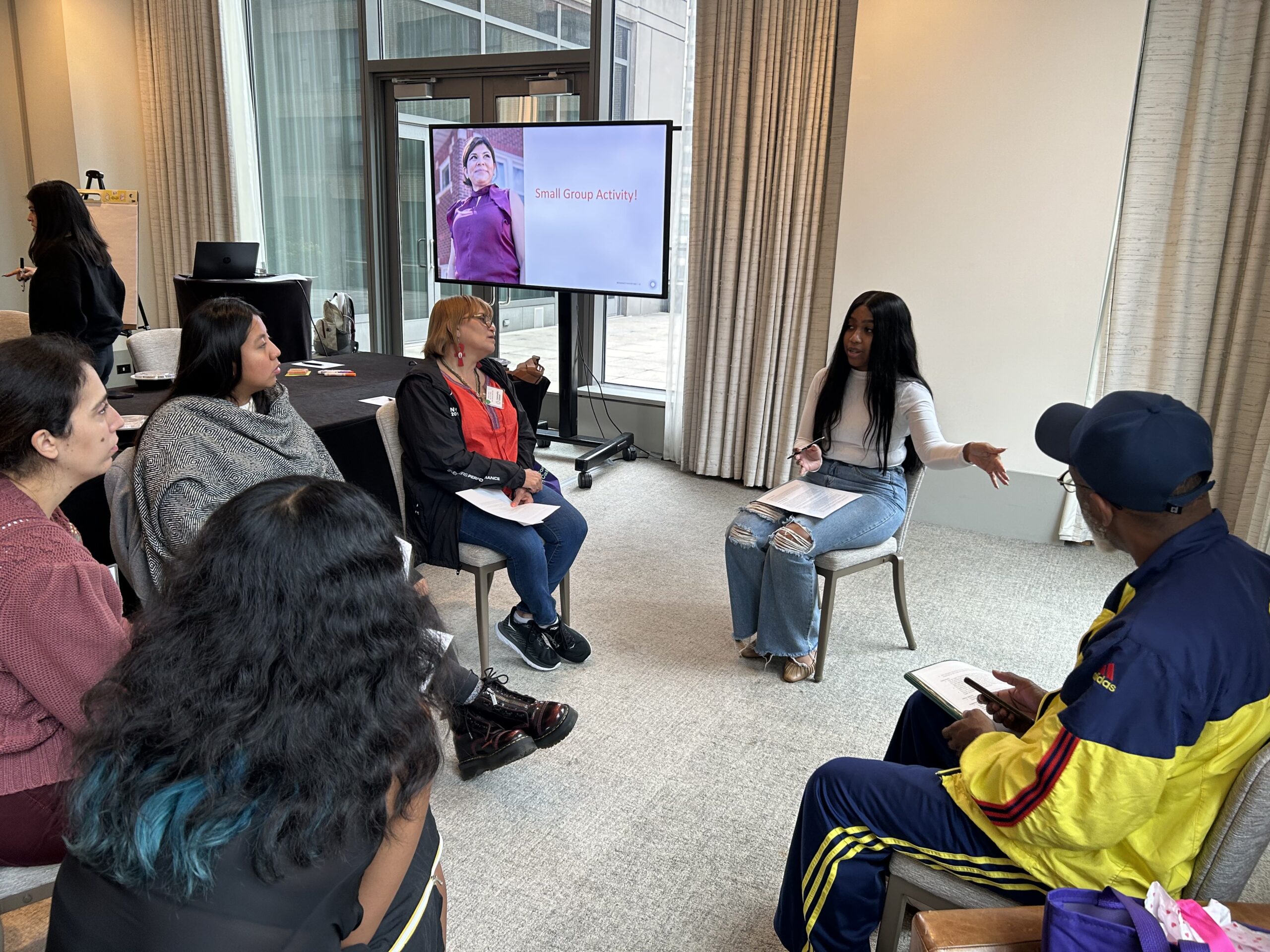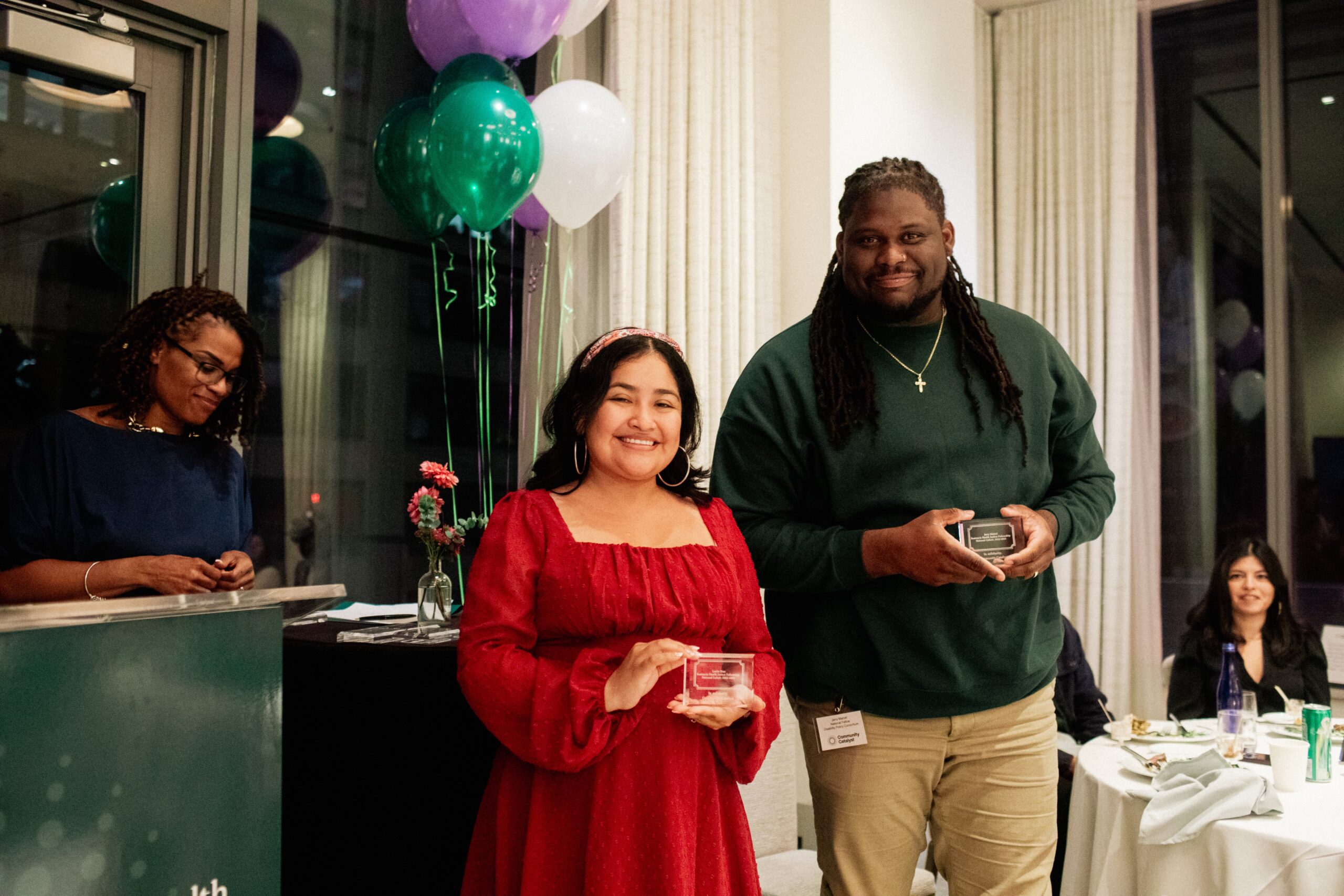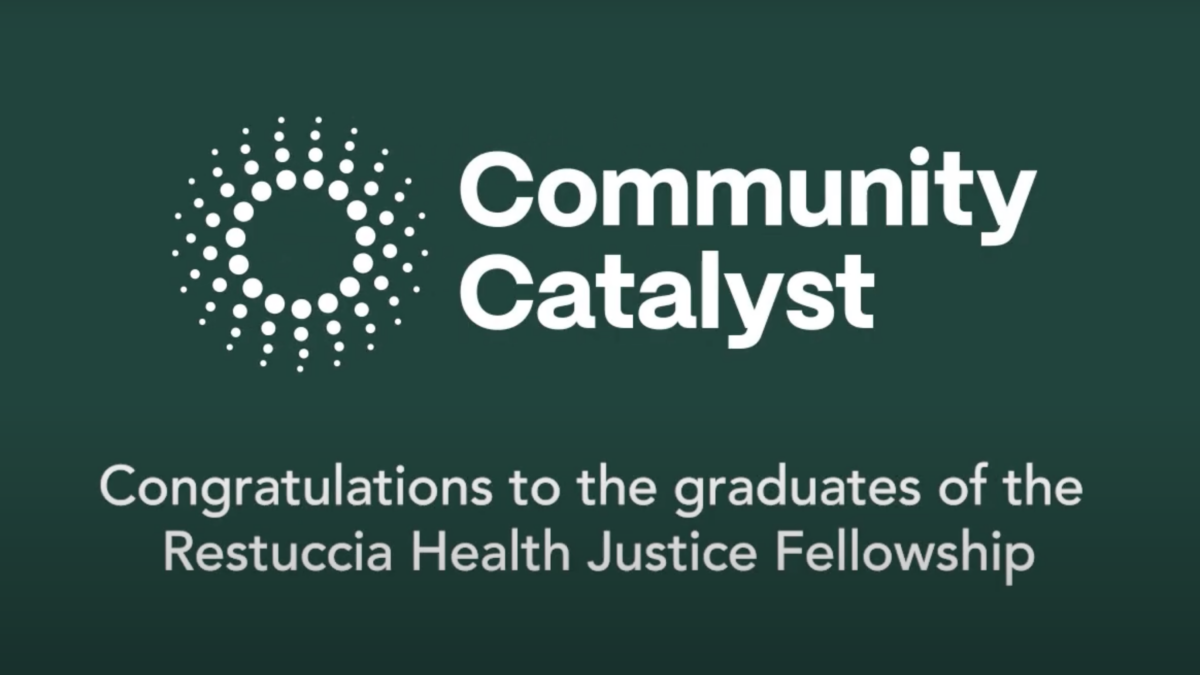Restuccia Health Justice Fellowship Offers Refuge and Community to Advocacy Leaders
Apply to join the 2024-2025 cohort by March 25
In the fight for health justice, we are up against a complex system of corporate interests.
We need an even stronger, more united movement where we work together across local, state, and national levels to make the health care system responsive and accountable to all people.
Community leaders are vital to this movement. But doing advocacy work isn’t easy – it can be stressful and overwhelming. This is especially true for communities that have been impacted most by racism, classism and other forms of oppression.
Rosa Flores, director of programs for the Latino Coalition for a Healthy California, knows the difficulty of finding time for introspection as an advocate.
“In the policy and advocacy space and field, you don’t often get a chance to slow down and reflect on how internal dialogue is affecting external efforts,” Rosa said.
While those who face the most harm are often the best positioned to create solutions, advocates and organizations of color experience double the work – their advocacy is both personal and professional.
Investing in leaders who are experiencing systemic harm first-hand while also working to transform the health care system is essential, both for advocates of color and the movement as a whole.
Large-scale, systemic change takes time, patience and perseverance. But it also takes guts, vision and collaboration among the people most impacted, community leaders and organizers, policy experts and health care leaders who share our vision for change.
While we can’t out-spend corporate interests in the fight for health justice, we can out-organize them. By building and leveraging power in our communities, we can continue to make structural health system change.
The truth is – we need to build more power if we’re going to create a health system rooted in race equity and health justice – a health system shaped by and accountable to all people.
Advocates and community leaders, especially those from systemically excluded communities, are expressing a desire for more programs that offer the support and resources needed to do the work, while also confronting burnout and learning new strategies to transform their organizations.
As part of Community Catalyst’s efforts to build collective power and impact through leadership development and infrastructure support, the Restuccia Health Justice Fellowship (the “Fellowship”) focuses on building the power and capacity of advocacy leaders and their organizations who are actively working to reshape the US health system to better reflect and respond to their community’s needs.
The program is specifically designed to meet the wants and needs of our community of partners. It aims to deliver inspiration and strategies centered on race equity to inform broader, systemic changes needed in the health justice movement.
The Fellowship prioritizes organizations and leaders of color who are working to reshape the health system, inviting leaders and diverse teams to address the historically discriminatory roots of our health system.
Our offering to community
The Fellowship offers multifaceted support, including coaching from top experts in organizational management, health systems, advocacy, race equity and leadership development to help advocacy leaders implement their organizational goals and transformation.
In its third year, the Fellowship has further refined its focus to hold even more space for radical self-care, healing and safety within frameworks that promote community and vulnerability.
To date, 22 Fellows from all regions of the country have graduated from the program. Fellows have done innovative and impactful work to advance race equity and health justice as part of the Fellowship.

“We were able to identify actionable steps and a feasible plan of seeing our organizational transformation come to life,” said Candace Brown, a 2022-2023 national Fellow with Missouri-based organization Better Family Life.
Better Family Life (BLF) works to build strong families and communities by providing hope, comprehensive services and meaningful opportunities to individuals, youth and families in the St. Louis area.
As part of their organizational transformation during the Fellowship, advocacy leaders from BLF delivered the first iteration of the Evidence-Based Whole Identity Responsive Model to increase utilization of the organization’s services. Their research focused on the local community with the goal of increasing the organization’s cultural responsiveness.
“We are proud to say that we were able to successfully achieve the goals that we set for ourselves when we entered the Fellowship, and it was because of the support we received,” Candace said.
As part of the program, 2021-2022 Fellows from Illinois Coalition for Immigrant and Refugee Rights (ICIRR) focused on strategic planning and the creation of the first-in-the-nation Immigrant Health Academy, which seeks to overcome barriers and empower communities. The Academy is a training school developed and led by immigrants to understand their health rights, prioritize their health, and empower other immigrants to do the same.
The importance of culture
A unique facet of the Fellowship is its culture, built on three core values that are woven throughout the experience: authenticity, wellness and community connection. The Fellowship culture encourages leaders to show up as they are, to practice self-care and collective care, and to build trust with other Fellows.
“One of my biggest takeaways is this feeling of being vulnerable and open amongst my peers,” said Jerry Marcel, a 2022-2023 national Fellow with Disability Policy Consortium.
“During the workshops, it just taught me to let go of all these insecurities that I didn’t think I had and this imposter syndrome, and showed me that I am good enough,” Jerry said, adding, “It allowed me to be vulnerable and say, ‘Hey, this is too much for me,’ or ask for help – all these things I had fought against because I thought I was protecting myself, but really I was doing myself a disservice.”

The Fellowship’s culture emphasizes building community and showing up authentically as being vital in the fight for health justice.
“We are three women of color femmes in the policy and advocacy space,” said Rosa, a 2022-2023 Fellow. “When we get to show up authentically and make that effort to share our lived experience along with our professional and academic experiences, it can be incredibly powerful and inspiring for our communities and allies, and I think it helps us connect well to other people. Restuccia helped us understand that at a deeper level.”
The fight for health justice needs passionate community leaders at its forefront. Apply today to be considered for the 2024-2025 Fellowship cohort.
How to Apply:
We are now accepting applications from local, state and national health advocates dedicated to pursuing a specific organizational transformation and deepening their practice towards race equity and health justice.
Join us with other health justice leaders to find the peer community, skills and inspiration needed to refuel and catalyze change!
Applications for the 2024-2025 cohort of the Fellowship will be accepted until March 25, 5 p.m. EST. You can find more information on how to submit your application here.
